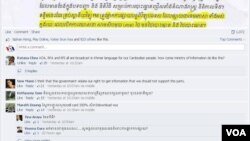WASHINGTON —
In the face of swift international condemnation, the Cambodian government on Saturday reversed a ban on the broadcast of foreign-produced radio programming ahead of national elections in July.
The Ministry of Information made its announcement on national television late Saturday night, following a ban circulated June 25 and widely reported by media outlets on Friday.
News of the ban spread quickly, as the country’s few independent broadcasters faced the prospect of radio silence for programming provided by the US, France and Australia, just as Cambodia entered a critical pre-election campaign period.
“According to requests to the Ministry of Information to allow the rebroadcast of foreign radio in Khmer language on local FM stations, the ministry has decided to allow FM stations that sell their airtime to those foreign radio stations to continue their broadcasts as normal from now on,” the ministry said in its statement.
The ruling Cambodian People’s Party and its supporters have a near monopoly on radio and television broadcasting in the country, where a predominantly rural population has little access to independent news.
The announcement was a reversal of a ban for the 31-day campaign period leading into the July 28 national elections, one that sparked widespread criticism within Cambodia and from the international community that the election’s credibility could be severely damaged.
The ban would have affected programming from the Voice of America, Radio Free Asia, Radio France International and the Australian Broadcasting Corporation.
“The decision to pull VOA off FM stations in Cambodia deprives audiences of vital news and information ahead of the July 28th general election,” VOA Executive Editor Steve Redisch said in a statement Friday. “Reliable, accurate and balanced news and information are critically needed ahead of elections. We condemn any effort to silence the media.”
The Broadcasting Board of Governors, which oversees the Voice of America and Radio Free Asia, also condemned the ban on Friday.
“By denying its citizens access to unbiased news and information in this critical time, [the Cambodian government] is undermining its own legitimacy and blatantly repudiating the very democracy it claims to espouse,” Victor Ashe, a member of the BBG’s governing board and vice chairman of the board overseeing RFA, said in a statement. “When I visited Cambodia in May, I met with leaders in the media and civil society. I know first-hand how much they rely on the reporting of RFA and VOA.”
The US State Department on Friday urged the Cambodian government to reconsider its decision.
“This directive is a serious infringement on freedom of the press and freedom of expression, and starkly contradicts the spirit of a healthy democratic process,” State Department spokesman Patrick Ventrell said in a statement.
VOA Khmer programming is broadcast on a seven FM stations, including Beehive Radio FM105 and the Women’s Media Center FM102 in Phnom Penh and Angkor Ratha FM95.5 in Siem Reap. Its television programming is carried on affiliates TVK and CTN.
The Ministry of Information made its announcement on national television late Saturday night, following a ban circulated June 25 and widely reported by media outlets on Friday.
News of the ban spread quickly, as the country’s few independent broadcasters faced the prospect of radio silence for programming provided by the US, France and Australia, just as Cambodia entered a critical pre-election campaign period.
“According to requests to the Ministry of Information to allow the rebroadcast of foreign radio in Khmer language on local FM stations, the ministry has decided to allow FM stations that sell their airtime to those foreign radio stations to continue their broadcasts as normal from now on,” the ministry said in its statement.
The ruling Cambodian People’s Party and its supporters have a near monopoly on radio and television broadcasting in the country, where a predominantly rural population has little access to independent news.
The announcement was a reversal of a ban for the 31-day campaign period leading into the July 28 national elections, one that sparked widespread criticism within Cambodia and from the international community that the election’s credibility could be severely damaged.
The ban would have affected programming from the Voice of America, Radio Free Asia, Radio France International and the Australian Broadcasting Corporation.
“The decision to pull VOA off FM stations in Cambodia deprives audiences of vital news and information ahead of the July 28th general election,” VOA Executive Editor Steve Redisch said in a statement Friday. “Reliable, accurate and balanced news and information are critically needed ahead of elections. We condemn any effort to silence the media.”
The Broadcasting Board of Governors, which oversees the Voice of America and Radio Free Asia, also condemned the ban on Friday.
“By denying its citizens access to unbiased news and information in this critical time, [the Cambodian government] is undermining its own legitimacy and blatantly repudiating the very democracy it claims to espouse,” Victor Ashe, a member of the BBG’s governing board and vice chairman of the board overseeing RFA, said in a statement. “When I visited Cambodia in May, I met with leaders in the media and civil society. I know first-hand how much they rely on the reporting of RFA and VOA.”
The US State Department on Friday urged the Cambodian government to reconsider its decision.
“This directive is a serious infringement on freedom of the press and freedom of expression, and starkly contradicts the spirit of a healthy democratic process,” State Department spokesman Patrick Ventrell said in a statement.
VOA Khmer programming is broadcast on a seven FM stations, including Beehive Radio FM105 and the Women’s Media Center FM102 in Phnom Penh and Angkor Ratha FM95.5 in Siem Reap. Its television programming is carried on affiliates TVK and CTN.








